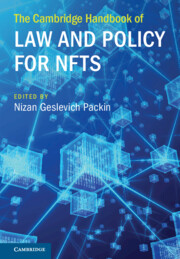Book contents
- The Cambridge Handbook of Law and Policy for NFTs
- The Cambridge Handbook of Law and Policy for NFTs
- Copyright page
- Dedication
- Contents
- Figures
- Tables
- Contributors
- Acknowledgments
- Part I Introduction and Background
- Part II Financial Regulation and Investor Protection
- Part III Capital Markets, Community, and Marketing
- 7 Non-Investment Finance in an NFT World
- 8 Asymmetric Information in Blockchain-Based Fundraising
- 9 Power to the People
- 10 The Nexus of Gaming and NFTs
- Part IV Intellectual Property and Ownership Rights
- Part V Data Protection, Privacy, Cybersecurity, and NFTs
- Part VI Other Legal Issues with NFTs
- Part VII Conclusions and Future Directions
- Index
10 - The Nexus of Gaming and NFTs
A Deep Dive into the Future of Digital Interaction
from Part III - Capital Markets, Community, and Marketing
Published online by Cambridge University Press: 02 November 2024
- The Cambridge Handbook of Law and Policy for NFTs
- The Cambridge Handbook of Law and Policy for NFTs
- Copyright page
- Dedication
- Contents
- Figures
- Tables
- Contributors
- Acknowledgments
- Part I Introduction and Background
- Part II Financial Regulation and Investor Protection
- Part III Capital Markets, Community, and Marketing
- 7 Non-Investment Finance in an NFT World
- 8 Asymmetric Information in Blockchain-Based Fundraising
- 9 Power to the People
- 10 The Nexus of Gaming and NFTs
- Part IV Intellectual Property and Ownership Rights
- Part V Data Protection, Privacy, Cybersecurity, and NFTs
- Part VI Other Legal Issues with NFTs
- Part VII Conclusions and Future Directions
- Index
Summary
In an era where two-fifths of the global population is engaged in gaming, this industry’s technological and economic evolution is of paramount importance, promising continued growth. Beyond mere entertainment, gaming has become a primary medium for social interaction, enriched by technologies like virtual, augmented, and extended reality. Gaming has increasingly become intertwined with the financial market as game developers shift their focus from gameplay enjoyment to monetization of in-game assets and some players prioritize the potential for livelihood in gaming. This transformation has been accelerated by the integration of blockchain, decentralized finance (DeFi) protocols, and non-fungible tokens (NFTs), which provide users with more control over their in-game assets and enable external trading of such assets in the secondary market. This chapter delves into this integration, examines its impact on the gaming industry, and provides a high-level overview of key related legal and ethical issues that warrant further exploration.
- Type
- Chapter
- Information
- The Cambridge Handbook of Law and Policy for NFTs , pp. 196 - 214Publisher: Cambridge University PressPrint publication year: 2024

